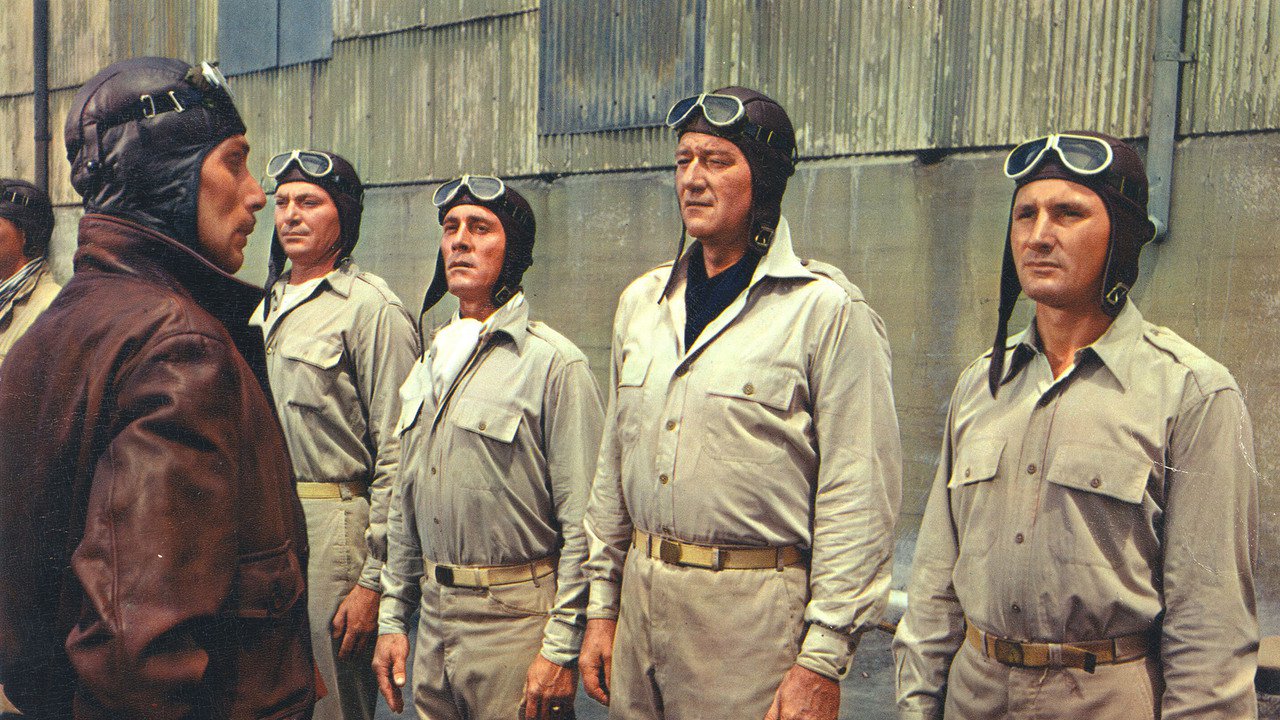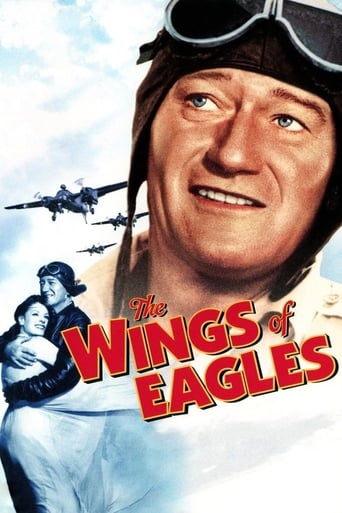

With John Wayne, John Ford, Dan Dailey, and Maureen O'Hara involved in a true life story of a friend, you expect a perfect film here. What happens though is an interesting film, but not a great one. John Wayne plays a person who is looked upon as a hero, and give the film credit, it shows that he had many flaws. This film, which followed the classic The Searchers, just does not get to that level.There is more honesty in this one than you'd expect. Wayne actually for one of the few times in his career, works without his toupee. While the story of Wead is inspirational, he comes back from a major fall and neck injury, his life is a mix which is accurately depicted here.Wead appears to love his wife and children, but alt of most always throws them aside for his love of aviation, the Navy, and his own writing and partying. His priorities are way out of whack, yet he somehow keeps going and then recovers in a miracle from near paralysis. Maureen O'Hara only gets a few good scenes in this one as his wife.The interesting thing to Wead is that even after this miracle, he still does not appear to have learned any lesson about change. His priorities stay out of whack and he never seems to get a personal life with goals that make sense.Wayne is not comfortable playing Wead, and Ford though accurate with the main character, appears not to get a lot of the fine detail work of events behind the Biopic accurate. After The Searchers, this is truly a let down.Still, it is a movie which needed to be made because I have to admit everyone involved resisted the urge to make Wead a God to be worshiped. He obviously wasn't and you suspect after viewing it that his personal live might have gotten some white washing still. In that way, this film has a quality a lot of biopics being made in the 1950's do not. Even when he recovers and moves his left toe, they don't make it a message from God.Dan Dailey getting to do a song is a rare bonus here. Wayne does an excellent job with showing the physical problems with Wead, even after his left toe recovers. This does stick out as a unique enough effort that it is worth a look. We only wish it were more.
... View MoreFrank "Spig" Wead's life story, as directed by real-life friend John Ford, starring John Wayne as the hot-shot aviation expert who transforms the U.S. Navy in the 1920s with his piloting prowess, rivaling (but not alienating) the Army in aviation power; later, after suffering a spinal cord injury and a separation from his wife and children, Wead discovers an untapped talent for writing, becoming a successful screenwriter and playwright! Ford bounces jovially from aerial slapstick to human drama to personal tragedy to wartime chaos, and, despite some bumps, keeps this biography lively and colorful. John Wayne and Maureen O'Hara, both of whom toss cigarettes and matches away with abandon, are reassuring as husband and wife, and though O'Hara's initial exit is perplexing, Ford's handling of the narrative doesn't jar us with unresolved feelings. The third act during WWII is just a jumble of patriotic scenes, but Wayne's expression at the finale is surprisingly genuine. He and Ford do Wead's incredible story justice. **1/2 from ****
... View MoreI feel like I'm missing something...Spig sacrifices his personal life with that bad-ass Maureen O'Hara because of his sense of duty to the Navy. Maureen is smoking all the time because she's frustrated. His daughters are these barely - seen cutie pies. His real love affairs are with the Navy, and by extension with his colleagues. Dan Dailey does the kind of Ford extension of the Walter Brennan surrogate wife thing. And plays the hell out of the Ukelele. Ward Bond does a cool John Ford impression. The Army vs. Navy fights are that kind of usual Ford free-for-all that later becomes the subject of Donovan's Reef. They're very stylized but not particularly compelling. Some people put this one up with Ford's best. Why?
... View MoreI just caught this on TCM. It's a stretch in acting for Wayne, I think. He rarely did characters with flaws, either physical or mental.But he does a great job.Did anyone catch a wonderful comment made by Wayne while he and the naval staff were watching films of the carriers being bombed? Wayne is commenting that the solution to the Navy's problem is obvious, but it is eluding him. There is some banter about how to get your thinking going when it's at a standstill. That is, how to get into action when things seem unworkable. Wayne comments, "In Hollywood we'd stop and look around and here's the 7th cavalry coming." All things considered, I thought it a great comment!
... View More